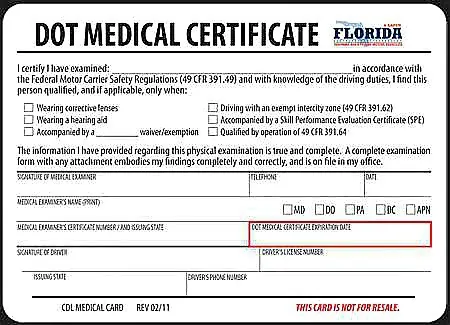Do you have plans of starting a career in commercial driving in Alabama and have no idea what stands in your way? While getting a Commercial Driver’s License opens many avenues, not everyone qualifies for it. From prior driving offenses to medical restrictions, several reasons may cause one to be disqualified from getting a CDL in Alabama. In this article, we will take a closer look at the key disqualifiers so that you know how to avoid the most common pitfalls and increase your chances of getting your CDL without any hitch.
What disqualifies you from getting a CDL in Alabama?
You will not be eligible to obtain a CDL in Alabama if you have a criminal record based on certain felonies such as drug or alcohol-related offenses, or serious traffic offenses, like DUI or reckless driving. The details of these disqualification cases are shown in the following sections.
Alcohol-related offenses, accidents, and felony convictions

Operating a CMV in the State of Alabama is a serious responsibility and equally serious are the consequences associated with alcohol, accidents, and criminal activity involving your vehicle. It is considered unlawful for you to drive a CMV if your blood alcohol concentration is .04% or higher; and as an operator of a CMV, you are considered to have given your consent to an alcohol test. The following actions result in the mandatory one-year suspension of your CDL for a first offense:
- Driving a CMV with an alcohol concentration of .04% or higher.
- Using a CMV while the driver has any alcohol in their system.
- Failure to test for alcohol after being detained.
- Driving a CMV under the influence of controlled substances.
- Leaving the scene of an accident involving a CMV
- Using a CMV in the commission of a felony
Penalties for hazmat-related offenses, your CDL will be disqualified for at least three years. A second offense will result in the loss of your CDL for life. In addition, the utilization of a CMV in the commission of a felony related to controlled substances is considered a violation that leads to the permanent revocation of the CDL.
If your BAC is under .04%, but alcohol was found in your system, an out-of-service period of 24 hours will be imposed. Remember, such violations significantly affect your qualification to drive a CMV and, correspondingly, your professional advancement as a commercial driver.
Severe traffic violations
The major traffic offenses of Alabama, when committed in a CMV, have serious consequences against your CDL. These are excessive speeding 15 mph or more over the posted speed limit, reckless driving, erratic lane change, tailgating, and committing traffic offenses connected to fatal accidents while driving a CMV. Driving a CMV without a valid CDL or proper class and endorsements also constitute serious violation.

While two serious traffic offenses within three years will cost you at least a 60-day suspension of your CDL, three or more serious traffic offenses during that three-year period will amount to at least a 120-day suspension of your CDL. This is a very rigid penalty to ensure road users are safe, qualifying only those who are capable of driving commercial vehicles on the road.
Violation of out-of-service orders
An out-of-service order violation in Alabama will lead to serious penalties against your CDL. If you violate such an order, it means that he or she is not fit or safe enough for operating a CMV just because of concerns of safety violations. Thus, violation of this order is penalized accordingly. If you violate the out-of-service order, the penalties will be as follows:
- At least 90 days, for your first violation.
- Two violations within ten years: at least one year.
- Three years or more: if you commit three or more violations within a ten-year period.
These are penalties placed only to ensure the safety of the general public, as well as to set high standards for operators on the road who are using CMVs.
Railroad-highway crossing violations
Violations of railroad-highway grade crossings can lead to serious penalties for commercial driver’s license holders in Alabama. Violations include failure to comply with federal, state, or local laws governing safety at railroad crossings. Should you make any of the following offenses, here is what you will be facing from the CDL suspensions:
- First violation: for no less than 60 days.
- Second violation within three years: for no less than 120 days.
- At least one year for your third offense in a three-year time frame.
These include violations of a federal, state or local law or regulation concerning one of the following six offenses at a railroad-highway grade crossing:
- Failure to stop when you approach a crossing when the tracks are not in view, if not required to always stop.
- Failure to slow down or look for an approaching train at crossings (if not required to always stop).
- Failure to stop completely before driving onto the crossing when drivers are always supposed to stop
- Failure to determine if adequate space is available for driving completely through the crossing without stopping
- Failure to obey traffic control devices or any instructions from officers at the crossing
- Failure to cross due to lack of undercarriage clearance
The penalties are this high in order to deter an incident from occurring and to guarantee safety while crossing the railroad.
Hazardous endorsement background check

To obtain a hazardous materials endorsement on your CDL you must undergo a background check, including fingerprinting. You will not be eligible to obtain or will be denied a hazardous materials endorsement if you:
- Are not a lawful permanent resident of the United States.
- Renounce your U.S. citizenship.
- Are wanted or under indictment for certain felonies.
- Have a conviction in military or civilian court for specific felonies.
- Have been adjudicated as mentally defective or committed to a mental institution.
- Are considered a security threat by the Transportation Security Administration.
Some jurisdictions may have slightly different methods for processing a background check; thus, specific procedures given to you by your licensing agency should be followed when attempting to complete the TSA screening.
Personal vehicle traffic violations
Under the Motor Carrier Safety Improvement Act (MCSIA) of 1999, certain traffic offenses in your personal vehicle will result in the loss of your CDL. If your license to operate your personal vehicle is revoked, canceled, or suspended for moving violations (other than parking violations), you lose your CDL driving privileges.
Your license is revoked, canceled, or suspended for alcohol, controlled substance, or felony offenses, and you will be disqualified from your CDL for one year. If a second offense occurs, the penalty is lifetime CDL disqualification.
Moreover, you will not be able to get a “hardship” license to drive a CMV if your personal vehicle license is revoked, canceled or suspended. These listed are just some of the consequences that you will face for violations, showing just how important it is to keep a clean driving record both in your personal and commercial driving.
FAQs
1. What prevents you from getting a CDL in Alabama?
There are a number of reasons that might prohibit you from obtaining a Commercial Driver’s License in Alabama. These include but are not limited to the following:
- Your driving record is poor due to multiple DUI convictions or serious traffic offenses.
- You also have health-related issues, like eye and ear problems, or some chronic health conditions that set you below the health standard requirements.
- A criminal record, such as convictions concerning a controlled substance or felonies relating to a motor vehicle.
- Failure to pass written and skills test requirements for the CDL application process.
- Insufficient proof of identity and other required documents set by the state.
2. What felonies disqualify you from getting a CDL in Alabama?
There are many felonies that may disqualify you from obtaining a CDL in Alabama, including:
- Controlled substance felonies: convicted of a drug or alcohol-related felony.
- Felony convictions related to a CMV: crimes as vehicular manslaughter, using a CMV to commit a felony, or serious traffic violations linked to a fatality.
- Violent felonies: these could include assault and robbery.
- Convictions for some felonies involving theft or fraud: based on the nature of the felony that can be dishonesty or theft.
3. Can you get a CDL in Alabama without going to school?
No, you cannot get a CDL in Alabama without going to school. According to federal law, all future commercial drivers must receive training from a certified training provider to satisfy the Entry-Level Driver Training rule. You can legally get a Commercial Learner’s Permit on your own, but you will need to complete an approved training program before you can take the skills and road test to get your CDL. This ensures that drivers can meet minimum required standards for safety and prepare them for responsibilities involved in operating a commercial vehicle.
Final thoughts
To those seeking to start a career in commercial driving, the various requirements and potential disqualifiers associated with applying for a CDL in Alabama are critical to understand. Preparation can help you save your time and prevent frustration on your pathway to obtain a CLD. The step-by-step process for how to get a CDL in Alabama can be quite complicated; make it simple by starting to make sure your qualifications are all satisfied. Avoid disqualifying factors, and it’s time to begin unlocking that door to a rewarding trucking industry career. Good luck!



